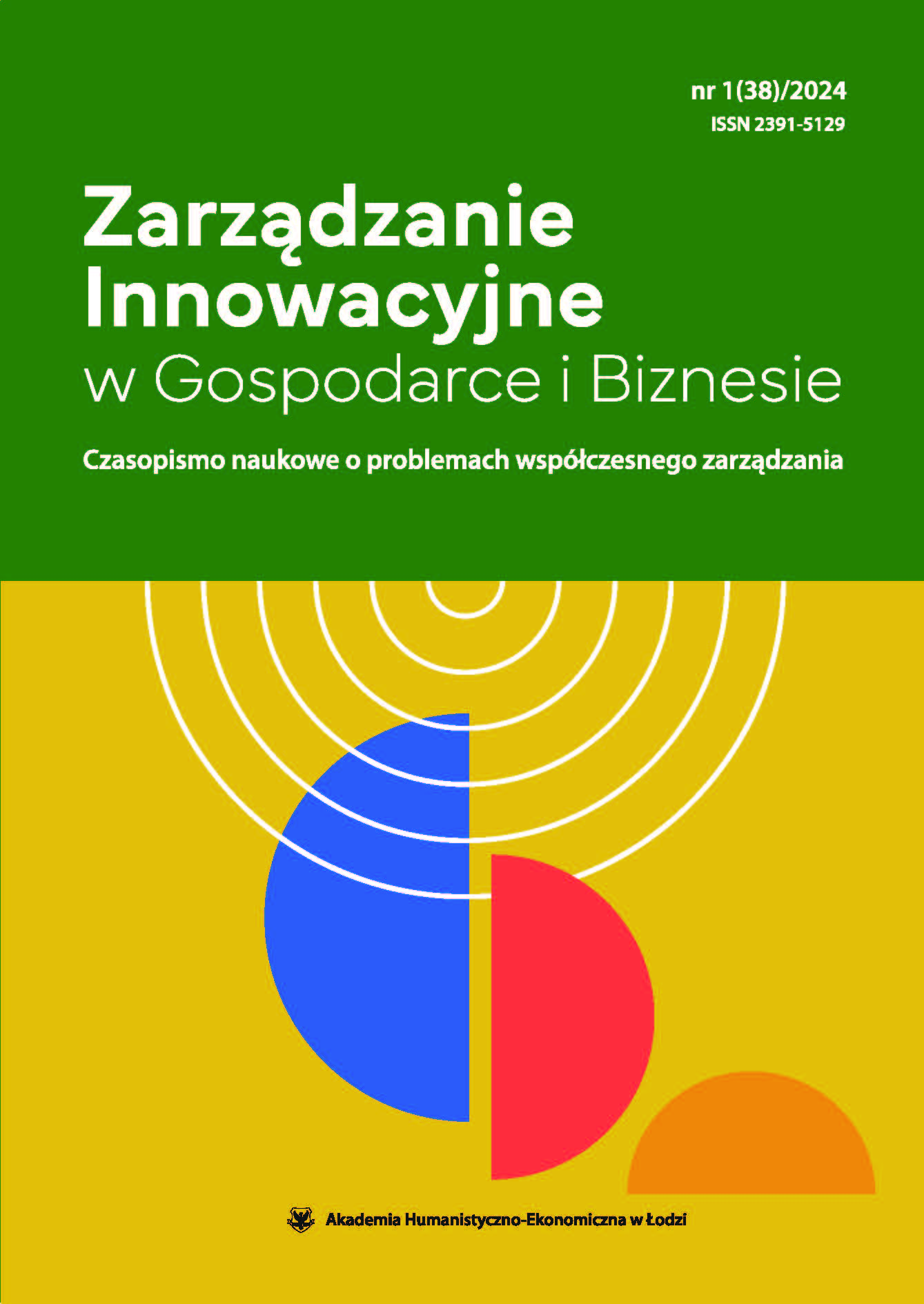Koncepcja zrównoważonego rozwoju w systemach produktowo-usługowych
DOI:
https://doi.org/10.25312/2391-5129.38/2024_05pnoSłowa kluczowe:
zrównoważony rozwój, PSS, systemy produkt-serwis, produkcja, usługiAbstrakt
Współczesny świat staje przed nieustannie rosnącymi wyzwaniami związanymi ze zrównoważonym rozwojem, które obejmują zmiany klimatyczne, degradację środowiska naturalnego oraz nierówności społeczne. W odpowiedzi na te wyzwania coraz więcej organizacji z różnych sektorów gospodarki włącza koncepcję zrównoważonego rozwoju w swoje strategie zarządzania. Jednym z obszarów, gdzie ta koncepcja znalazła zastosowanie, są systemy produktowo-usługowe (PSS).
Systemy produktowo-usługowe, czyli PSS, to innowacyjne podejście projektowe, które koncentruje się na połączeniu tradycyjnych produktów z usługami w celu dostarczenia klientom wartości końcowej. W kontekście zrównoważonego rozwoju PSS oferuje obiecujące możliwości ograniczania negatywnego wpływu produktów na środowisko poprzez przedłużenie ich żywotności, zwiększanie efektywności wykorzystania zasobów oraz promowanie modeli konsumpcji opartych na dostarczaniu usług.
Niniejszy artykuł ma na celu przedstawienie koncepcji zrównoważonego rozwoju w kontekście systemów produktowo-usługowych oraz analizę rozwiązań, korzyści i wyzwań, związanych z zastosowaniem PSS w osiąganiu celów zrównoważonego rozwoju.
Pobrania
Bibliografia
Baines T.S., Lightfoot H.W., Benedettini O., Kay J.M. (2009), The servitization of manufacturing, „Journal of Manufacturing Technology Management”, vol. 20(5), s. 547–567. DOI: https://doi.org/10.1108/17410380910960984
Bertoni M. (2019), Multi-Criteria Decision Making for Sustainability and Value Assessment in Early PSS Design, „Sustainability”, vol. 11(7), s. 1952– 1979. DOI: https://doi.org/10.3390/su11071952
Bocken N.M.P., Short S.W., Rana P., Evans S. (2016), A literature and practice review to develop sustainable business model archetypes, „Journal of Cleaner Production”, vol. 65, s. 42–56. DOI: https://doi.org/10.1016/j.jclepro.2013.11.039
Botsman R., Rogers R. (2010), What’s Mine Is Yours: The Rise of Collaborative Consumption, Harper Business, New York.
Brenner B. (2018), Transformative Sustainable Business Models in the Light of the Digital Imperative – A Global Business Economics Perspective, „Sustainability”, vol. 10, s. 4428. DOI: https://doi.org/10.3390/su10124428
Brundtland G. (1987), Our Common Future, World Commission on Environment and Development (WCED), Oxford University Press, Oxford.
Ceulemans K., Lozano R., Alonso-Almeida M.D.M. (2015), Sustainability Reporting in Higher Education: Interconnecting the Reporting Process and Organisational Change Management for Sustainability, „Sustainability”, vol. 7(7), s. 8881–8903. DOI: https://doi.org/10.3390/su7078881
Daly H.E. (1990), Toward some operational principles of sustainable development, „Ecological Economics”, vol. 2(1), s. 1–6. DOI: https://doi.org/10.1016/0921-8009(90)90010-R
De la Calle A., Freije I., Oyarbide A. (2021), Digital Product – Service Innovation and Sustainability: A Multiple-Case Study in the Capital Goods Industry, „Sustainability”, 13(11), s. 6342. DOI: https://doi.org/10.3390/su13116342
Dobson A. (1996), Environmental sustainabilities: an analysis and a typology, „Environmental Politics”, vol. 5(3), s. 401–428. DOI: https://doi.org/10.1080/09644019608414280
Ecodesign for Sustainable Products Regulation (2023), European Commission, https://commission.europa.eu/energy-climate-change-environment/standards-tools-and-labels/products-labelling-rules-and-requirements/sustainable-products/ecodesign-sustainable-products-regulation_en [dostęp: 25.09.2023].
Goedkoop M.J., van Halen C.J.G., te Riele H.R.M., Rommens P.J.M. (1999), Product Service System, Ecological and Economic Basic. The Report No. 1999/36 Submitted to Ministerje van Volkshuisvesting, Ruimtelijke Ordening en Milieubeheer, Hague.
Goodland R. (1995), Environmental Sustainability in Agriculture: Diet Matters, „Ecological Economics”, vol. 23(3), s. 189–200. DOI: https://doi.org/10.1016/S0921-8009(97)00579-X
Jan I.U., Ji S., Yeo C. (2019), Values and Green Product Purchase Behavior: The Moderating Effects of the Role of Government and Media Exposure, „Sustainability”, vol. 11(23), s. 6642. DOI: https://doi.org/10.3390/su11236642
Janik M. (2019), Ikea rusza z wypożyczalnią mebli. Wiemy, od kiedy usługa będzie dostępna w Polsce, https://innpoland.pl/151495,ikea-poszerza-profil-dzialalnosci-bedzie-testowac-w-polsce-leasing-mebli [dostęp: 28.09.2023].
Jasek M. (2022), „Repair is the new cool”. Patagonia otwiera centrum naprawy ubrań, https://fashionbiznes.pl/repair-is-the-new-cool-patagonia-otwiera-centrum-naprawy-ubran/ [dostęp: 28.09.2023].
Johnson M.W., Suskewicz J. (2019), Lead from the Future, Harvard Business Review Press.
Kates R.W., Parris T.M., Leiserowitz A.A. (2005), What is sustainable development? Goals Indicators, Values and Practice, „Environment: Science and Policy for Sustainable Development”, vol. 47(3), s. 8–21. DOI: https://doi.org/10.1080/00139157.2005.10524444
Lélé S.M. (1991), Sustainable development: A critical review, „World Development”, vol. 19(6), s. 607–621. DOI: https://doi.org/10.1016/0305-750X(91)90197-P
Manzini E., Vezzoli C. (2003), A strategic design approach to develop sustainable product service systems: examples taken from the 'environmentally friendly innovation' Italian prize, „Journal of Cleaner Production”, vol. 11(8), s. 851–857. DOI: https://doi.org/10.1016/S0959-6526(02)00153-1
Meadows D.H., Meadows D.L., Randers J., Behrens W.W. (1972), The Limits to Growth, Universe, New York.
Meier H., Roy R., Seliger G. (2010), Industrial product-service systems – IPS2, „CIRP Annals”, vol. 59(2), s. 607–627. DOI: https://doi.org/10.1016/j.cirp.2010.05.004
Mont O.K. (2002), Clarifying the concept of product – service system, „Journal of Cleaner Production”, vol. 10, s. 237–245. DOI: https://doi.org/10.1016/S0959-6526(01)00039-7
Morelli N. (2006), Developing new product service systems (PSS): Methodologies and operational tools, „Journal of Cleaner Production”, vol. 14, s. 1495–1501. DOI: https://doi.org/10.1016/j.jclepro.2006.01.023
Muñoz López N., Santolaya Sáenz J.L., Biedermann A., Serrano Tierz A. (2020), Sustainability Assessment of Product–Service Systems Using Flows between Systems Approach, „Sustainability”, vol. 12(8), s. 3415. DOI: https://doi.org/10.3390/su12083415
Nussbaum M.C. (2011), Creating Capabilities: The Human Development Approach, Harvard University Press. DOI: https://doi.org/10.4159/harvard.9780674061200
Redclift M. (2005), Sustainable development (1987–2005): an oxymoron comes of age, „Sustainable Development”, vol. 13(4), s. 212–227. DOI: https://doi.org/10.1002/sd.281
Rockström J., Steffen W., Noone K., Persson Å., Chapin F.S., Lambin E.F., Nykvist B. (2009), Planetary Boundaries: Exploring the Safe Operating Space for Humanity, „Ecology and Society”, vol. 14(2). DOI: https://doi.org/10.5751/ES-03180-140232
Roy R. (2000), Sustainable product-service systems, „Futures”, 32(3), s. 289–299. DOI: https://doi.org/10.1016/S0016-3287(99)00098-1
Saavedra García M.L. (2022), Business Sustainability and financial performance, „Cuadernos De Administración”, vol. 38(72). DOI: https://doi.org/10.25100/cdea.v38i72.10835
Sachs J. (2015), The Age of Sustainable Development, Columbia University Press, New York. DOI: https://doi.org/10.7312/sach17314
Siemens Healthcare, https://www.siemens-healthineers.com/ [dostęp: 28.09.2023].
Siuda D. (2022), The Role of Sustainable Consumption and Green Marketing in Consumers’ Purchase Decisions in the SMART Era, „European Management Studies”, vol. 20(96), s. 215–235. DOI: https://doi.org/10.7172/1644-9584.96.11
Smith P. (2013), Sustainable Consumption and Production, Green Energy and Technology.
Stewart R., Niero M. (2018), Circular economy in corporate sustainabilitystrategies: A review of corporate sustainability reports in the fast-movingconsumer goods sector, „Business Strategy and the Environment”, vol. 27(7), s. 1005–1022. DOI: https://doi.org/10.1002/bse.2048
Stiglitz J.E., Sen A., Fitoussi J.P. (2009), Report by the Commission on the Measurement of Economic Performance and Social Progress, Commission on the Measurement of Economic Performance and Social Progress.
Su J., Li C., Zeng Q., Yang J., Zhang J. (2019), A Green Closed-Loop Supply Chain Coordination Mechanism Based on Third-Party Recycling, „Sustainability”, vol. 11(19), s. 5335. DOI: https://doi.org/10.3390/su11195335
Tomczyk J. (2020), Produkt jako usługa, czyli jak nowe technologie zmieniają przemysł, https://przemyslprzyszlosci.gov.pl/produkt-jako-usluga-czyli-jak-nowe-technologie-zmieniaja-przemysl/ [dostęp: 26.09.2023].
Transforming our world: the 2030 Agenda for Sustainable Development (2015), United Nations, A/RES/70/1.
Tukker A. (2004), Eight Types of Product-Service System: Eight Ways to Sustainability? Experiences from Suspronet, „Business Strategy and the Environment”, vol. 13, s. 246–260. DOI: https://doi.org/10.1002/bse.414
Tukker A. (2015), Product services for a resource-efficient and circular economy – a review, „Journal of Cleaner Production”, vol. 97, s. 76–91. DOI: https://doi.org/10.1016/j.jclepro.2013.11.049
Vezzoli C., Ceschin F., Diehl J.C., Kohtala C. (2015), New design challenges to widely implement ‘Sustainable Product – Service Systems’, „Journal of Cleaner Production”, vol. 97, s. 1–12. DOI: https://doi.org/10.1016/j.jclepro.2015.02.061
Wang C., Ghadimi P., Lim M.K., Tseng M.L. (2018), A literature review of sustainable consumption and production: A comparative analysis in developed and developing economies, „Journal of Cleaner Production”, vol. 206, s. 741–754. DOI: https://doi.org/10.1016/j.jclepro.2018.09.172
Wynajem maszyn budowlanych, https://www.bm-cat.com/pl-pl/oferta/wynajem-maszyn-budowlanych [dostęp: 28.09.2023].
Zipcar (2023), https://www.zipcar.com/ [dostęp: 28.09.2023].
Opublikowane
Numer
Dział
Licencja
Prawa autorskie (c) 2024 Akademia Humanistyczno-Ekonomiczna w Łodzi

Utwór dostępny jest na licencji Creative Commons Uznanie autorstwa – Na tych samych warunkach 4.0 Miedzynarodowe.



